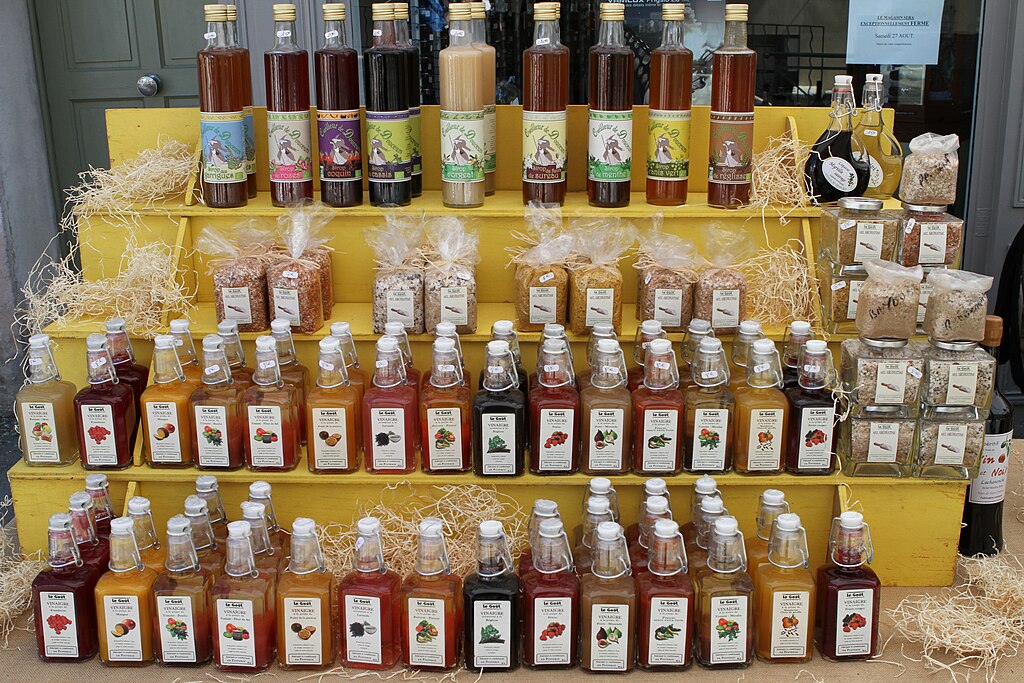All kinds of vinegar

All kinds of vinegar is a Green food. Green foods are safe to eat as a regular part of a diet.
Category Quotes
Guideline related quotes related to Non-Starchy, Condiments and Green throughout Geoff Bond's publications.
Eat at least 2 3/4 lbs of mixed salad and vegetables per day, consisting of "Green-Green” and “Green” foods. Of these, at least 3/4 lb should be mixed salad. Also include at least 5 cups of “Green-Green” leafy vegetables or 2 1/2 cups of other vegetables per week. ~Paleo in a Nutshell p.102
What about condiments? It's been said that the only way to get a kid to eat his vegetables is to smother them in ketchup. If that is what works, then it is tolerable; a good quality ketchup is not such a bad condiment. The main drawback is the sugar content. Read the ingredients label and only choose the best— there are low-salt, low-sugar versions available. Better yet is to make it yourself. ~Paleo in a Nutshell p.107
Additional Quotes
Specific references to All kinds of vinegar throughout Geoff Bond's publications.
A suitable choice for lunch is a mixed salad, and an appropriate quantity might be 12 oz. Weigh foods until you are used to estimating the quantities by eye— it's larger than you are used to. Get in the habit of thinking that a salad is often in two parts: The salad vegetables, comprised uniquely of foods from Food Group 3 (Non-starchy Vegetables), and some additions of protein-rich foods from Food Group 6 (Meat, Poultry, Eggs, and Fish). You can add tuna or chicken breast, for example, to the salad or eat as a side dish. Use a simple homemade vinaigrette of mustard, olive oil, lemon juice, and vinegar. ~Paleo in a Nutshell p.88
Eating in fast-food restaurants is a little harder. Find a salad, if you can; discard the packet of salad dressing, unless it is simple oil and vinegar. Consider carrying a bottle of your own vinaigrette. Or eat the all-day breakfast: Eggs with tomatoes and mushrooms (without bread or roll) are acceptable, but avoid the bacon, sausage, hash browns, toast, waffles, syrup, and muffins. It is not ideal to eat the processed meat in fast-food restaurants, but if you must, order the burger (no cheese) or grilled chicken sandwich and throw away the bun. ~Paleo in a Nutshell p.90
The other methods of preserving plant food are to be avoided: Freeze-dried (packet soups), canned (peas, green beans), pickled in salt (gherkins), syruped (fruit jams and jellies), and fermented (sauerkraut). That is not to say you can never eat these things, just do not think that they are proper food. Foods pickled in vinegar (such as onions) have lost many nutrients, but at least the pickling does not add undesirable chemicals. ~Paleo in a Nutshell p.92
Acids are compounds that taste sour and eat away at metals. Examples are the citric acid in lemons, acetic acid in vinegar, and sulfuric acid in car batteries. Alkalis (also known as "bases") are the opposite; in a way, they are the antidote to acids. For example, the stomach contains hydrochloric acid, which sometimes causes indigestion; the antidote is an alkali (or "antacid"), such as sodium bicarbonate and magnesium hydroxide. When acid and alkali cancel each other out, the result is neutrality— the blood is neither acid nor alkaline. ~Deadly Harvest p.108
Foods pickled in vinegar (such as onions) have lost many nutrients, but at least the pickling does not add undesirable chemicals. ~Deadly Harvest p.166